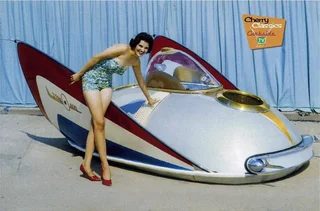
This is an EV technology I could live with. Not that I could ever own one: I’m retired and on a fixed income. It will continue to be old IC engines for me.
CC
,,, fueling would probably take five minutes and range expectations would be around 1200km on a fill, according to a guy I talked with last week. Bye-bye electric vehicles.
While that helps, but what matters is performance under real world conditions when you’re towing 1000lbs of tools.
(Breakthrough US hydrogen fuel cell promises 200,000-hour life with minimal power loss)
That’s what I use on my latest upgraded T-800 robots 🤖🤖🤖🤖
Every now and then one of the fuel cells goes unstable and blows up in the California desert 🏜️.
Just ignore that small mushroom cloud. The Russian ICBMs are coming later anyways.
If the reason for developing so called "green" energy it to cut down on greenhouse gases, then water vapor is way worse than CO2.
I'll continue to drive my Tundra to save Erf.
Yet another solution looking for a problem.
So 200K hours is about 22 years of continuous operation. Do they test it over that timeframe? IOW, did they start in 2003?
Feature Hydrogen Fuel Cell Internal Combustion Engine (ICE) Battery-Electric Truck Energy Source Hydrogen gas (H₂) Diesel or gasoline Lithium-ion battery (electric grid) Refueling/Charging Time 10–20 minutes 5–10 minutes 1–4 hours (fast charging); 8–12 hrs standard Range (typical) 300–500+ miles 500–1,200 miles 150–300 miles (currently) Weight Lighter than battery-electric (no heavy batteries) Light to moderate Heaviest (batteries are dense and heavy) Fuel Cost per Mile $1.00–$2.00 (current hydrogen cost) $0.50–$0.70 (diesel) $0.30–$0.50 (electricity) Maintenance Needs Low (few moving parts, but sensitive) Moderate to high (engine, fluids, wear & tear) Low (few moving parts) Emissions Water vapor only CO₂, NOₓ, particulates None (local); emissions depend on grid source Durability (New Tech) 200,000 hours (claim from UCLA study) ~1 million miles (with rebuilds) Battery lifespan ~8–10 years Infrastructure Sparse (limited hydrogen stations) Fully built out nationwide Expanding, but still limited for heavy trucks Vehicle Cost (current) $300K–$700K+ $100K–$150K $350K–$500K+ Ideal Use Case Long-haul trucking, quick refueling needs All-purpose Urban/local delivery, short haul Scalability (Future) Moderate (depends on green H₂ production, cost) Already maximized High (as battery tech improves)
Great demonstration project! Only problem is that hydrogen is the smallest molecule, and will escape (permeate its way through) all steel containers, transmission pipes and valves at the rate of 1% daily.
It is more efficient to run an EV on fossil fuels generated electricity. Than to use that same electricity to make hydrogen that fuel cell vehicles will run on.
Hydrogen is not a fuel. There are no hydrogen mines, no hydrogen wells. Hydrogen has to be made using electricity.
Hydrogen is a terribly inefficient storage medium. You input more energy manufacturing and transporting hydrogen than you get out.
So the ultimate next question is; will the government choose a winner/loser here with endless taxpayer subsidies?
Only 10 years away!
bkmk
Missing from the story is the fact that even though the fuel cells weigh much less than batteries, the trucks will still be required to transport the hydrogen fuel. Even when transported at 10,000 psi, hydrogen requires 7 times the volume compared with diesel fuel. That means times as big fuel tanks, not including the volume of the tank material. Steel tanks are very thick at that pressure.
I’ll wait until it is on the shelf next to Mr. Fusion.

Is it feasible to use water as the storage media, battery to do the electrolysis, and use the resulting hydrogen to run the fuel cell to keep the battery charged and run the vehicle? Hydrogen storage is short term and infrastructure for water generally not an issue.
Interesting. Thanks for posting.